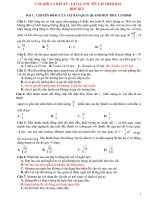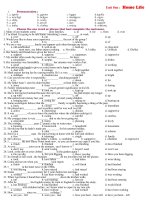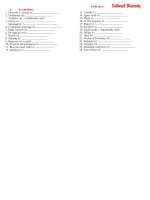On tap theo tung Unit. UNIT 3
Bạn đang xem bản rút gọn của tài liệu. Xem và tải ngay bản đầy đủ của tài liệu tại đây (96.21 KB, 2 trang )
Unit 3 : WAYS OF SOCIALIZING
1. Attract / get so attention (v) : …………………………………
2. Verbal # non-verbal (a) : …………………………………………
3. Wave (v)/(n) : ……………………………………………
4. Raise so hand (v) : ……………………………………………
5. Signal (n) : ……………………………………………
6. Suppose = Example : ……………………………………………
7. Appropriate (a)= suitable ………………………………………
8. Catch so eye (v) ……………………………………………
9. Slight (a) / Slightly (adv) ……………………………………………
10. Nod to so : ……………………………………………
11. Be considered : ……………………………………………
12. Situation (n) ……………………………………………
13. Formal # Informal (a) ……………………………………………
14. Approach (v) come near………………………………………
15. Situation (n) ……………………………………………
16. Point at (v) ……………………………………………
Complete the following sentences:
1. I didn’t think his comments were very ……………… at the time.
2. When you are in a restaurant, you can raise your hand slightly to show that you need ………………… …….
3. We can use either …………… …….or …………………….forms of communication to ……………….………………
4. Once you’ve got friend’s ………………. ,you shouldn’t ………………. the person or thing you want her to ……………… …at.
5. …………………… …. Tan Son Nhat airport, the pilot will ask for landing instructions.
1. A. hear B. clear C. bear D. ear
2. A. blood B. pool C. food D. tool
3 A. university B. unique C. unit D. undo
4. A. design B. reserve C. basic D. physical
5. A. perfect B. together C. certain D. verbal
6. A. union B. under C. fun D. uncertain
7. A. book B. should C. rude D. look
8. A. suggestion B. attention C. attraction D. situation
9. A. soil B. choice C. point D. coincide
10. A. suppose B. approach C. show D. probably
11. A. show B. shower C. down D. allow
12. A. fear B. near C. heard D. beard
13. A. discuss B. jump C. argument D. public
14. A. allowed B. considered C. travelled D. expressed
15. A. clap B. hand C. way D. catch
1. She is a kind of woman who does not care much of work but generally only with colleagues for meals ,movies
or late nights at a club. a. supposes b. socializes c. attention d. discussed
2. I didn’t think his comments were very appropriate at the time. a. correct b. right c. exact d. suitable
3. You should more attention to what your teacher explains. a. make b. get c. set d. pay
4. Body language is a potent form of communication. a. verbal b. non-verbal c. tongue d. oral
5. Our teacher often said ,”Who knows the answer? your hand.” a. Rise b. Lift c. Raise d. Heighten
6. This is the instance where big, obvious non-verbal signals are appropriate.
a. situation b. attention c. place d. matter
7. They started as gatherings but they have become increasingly formalized in the last few years.
a. informal b. informally c. informalize d. informality
8. Children who are isolated and lonely seem to have poor language and
a. communicate b. communication c. communicative d. communicator
9. The lecturer explained the problem very clearly and is always in response to questions.
a. attention b. attentive c. attentively d. attentiveness
10. Pay more attention picture and you can find out who is the robber. a. to b. for c. at d. on
11. She looked me , smiling happily and confidently. a. on b. over c. forward d. at
12. What an attractive hair style you have got , Mary ! _
a. Thank you very much. I am afraid. b. You are telling a lie.
c. Thank you for your compliment. d. I don’t like your sayings.
13. In most social situations , informality is appreciated. a. / b. the /an c. a/the d. the/a
14. The boys waved his hands to his mother, who was standing at the school gate, to her attention.
a. attract b. pull c. follow d. tempt
15. If something your attention or your eyes , you notice it or become interested in it.
a. pays b. allow c. catches d. wave
16. When you are in a restaurant, you can raise your hand slightly to show that you need assistance.
a. bill b. menu c. help d. food
17. After a hesitation , she began to speak with such a convincing voice. a.rude b.slight c.small d.important
18. There was a tremble in her voice, which showed that she was very nervous at that time.
a. slight b. slighted c. slightly d. slightness
19. If a boss wants to have a well-qualifed staff, he should have to pay his employees
a. appropriate b. appropriately c. appropriation d. appropriating
20. Mrs Pike was so angry that she made a gesture at the driver. a. rude b. rudeness c. rudely d. rudest
21. You look great in this new dress. _
a. With pleasure b. Not at all c. I’m glad you like it d. Do not say anything about it
22. When you see your teacher approaching you , a slight wave to attract his attention is appropriate.
a. coming nearer b. catching sight of c. pointing at d. looking up to
23. When you catch someone’s you do something to attract his attention so that you can talk to him.
a. head b. hand c. eye d. ear
24. When the play finished the audience stood up and their hands loudly.
a. clapped b. nodded c. shook d.hold
25. It is not to say “ Thank you” when you are given something. a.small b.rude c.slight d.formal
26. A whistle is the for the football players to begin the match. a.communication b.instance c.attention d. signal
27. It is often considered to be impolite to at someone. a. look b. smile c. point d. raise
28. He is not really friendly and makes no attempt to be a. sociaty b. social c. socialize d. sociable
29. She sent me a letter thanking me for my invitation. a. polite b. politely c. politeness d. impoliteness
30. How well you are playing! _
a. Say it again. I like to hear your words. b. I think so. I am proud of myself.
c. Thank you very much. d. Many thanks. That is a nice compliment.
31. Each society has its own beliefs, attitudes, customs, behaviours , and ……………………………habits.
A. social B. private C. public D. popular
32. Some people are often at the differences that exist between their own culture and the culture in the other country.
A. happy B. surprised C. good D. strange
33. People sometimes whether you can learn how body language works.
A. question B. inquire C. wonder D. require
34. Understanding and appreciating culture differences can help people avoid
A. accidents B. faults C. errors D. misunderstanding
35. Cultural differences can make people feel frightened or even insecure.
A. uncomfortable B. terrified C. inconvenient D. unreasonable
36. We can not only through words but also through body language.
A. talk B. transfer C. interpret D. communicate
37. … and interest are two major factors that make you succeed in your work.
A. Friendliness B. Friendly C. Friendship D. Unfriendly
38. It OK to use language if you’re speaking to a friend.
A. verbal B. non-verbal C. formal D. informal
39. Although I spoke to him many times, he never paid any to what I said.
A. notice B. care C. mind D. attention
40. After listening to all the I am now of the opinion that there should be no new road.
A. attitudes B. regulations C. compliments D. arguments
41. Some people think it is to ask someone’s age.
A. rude B. impolite C. disrespectful D. discourteous
42. It is very – more of a chat than an interview.
A. formal B. informal C. formality D. informality
43. Gestures such as waving and handshaking are forms of communication.
A. direct B. regular C. verbal D. non-verbal
44. I make no for encouraging my children to succeed in school.
A. apologize B. apologetic C. apologies D. apologetically
45. It’s knowledge that smoking and cancer are linked.
A. normal B. common C. wide D. complete
46. Mr Brown said, “I watched TV last night.”
> Mr Brown said that he TV the night before.
A. was watching B. watched C. had watched D. has watched
47. Bob said, “We had a wonderful time at Peter’s party.”
> Bob said a wonderful time at Peter’s party.
A. he had B. they had had C. we had D. we had had
48. Peter reported, “We played a lot of tennis last year.”
> Peter reported that they had played a lot of tennis
A. the following year B. the year before C. last year D. A&B are correct
49. The Clarks told us, “We drove right down to Athens last summer.”
> The Clarks told us right down to Athens
A. he had driven / the summer before B. they had driven / the summer before
C. they drove / the previous summer D. he drove / last summer
50. Mrs Miller said, “I don’t feel better now.” > Mrs Miller said she feel better
A. they not / now B. she doesn’t / then C. she didn’t / then D. they didn’t / now
51. Phil asked me, “Were you at the party?” > Phil asked me at the party.
A. had I been B. if I had been C. whether I was D. B&C are correct
52. Ann asked Kirk, “Did you really write this story?”
> Ann asked Kirk really story.
A. whether he had / written that B. if he wrote / that C. to write / this D. he had written / this
53. The mother asked him, “Why are your clothes so dirty?”
> The mother asked him why so dirty.
A. were his clothes B. my clothes are C. clothes were D. his clothes were
54. He wanted to know, “Which picture is the most famous one?”
> He wanted to know the most famous one.
A. which picture was B. whether it was C. which is D. that picture was
55. He told her, “Don't call me before 7 o'clock! > He told her before 7 o’clock.
A. not to call me B. not to call him C. to call him D. to call me The End.









